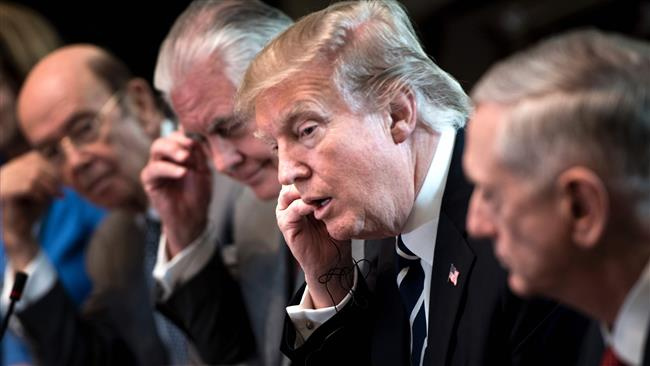Trump Throwing World Order into Chaos

In an interview with Persia Digest, former US Ambassador to Saudi Arabia said about the new US strategy on Iran: “Secretary Pompeo's "strategy" for dealing with Iran amounted to a call for regime change. It was welcomed by Israel and a few Gulf Arab states but spurned by the world's great powers, none of which is prepared to join the United States in military confrontation with Iran.”
Donald Trump has finally made good on his election campaign promise to quit the JCPOA Iran nuclear deal. Most countries have opposed his move, including the EU, China, and Russia. President Rouhani has announced that Iran will stay in the deal if the remaining signatories remain committed to it. But White House national security adviser John Bolton said Sunday that "it's possible" there will be secondary sanctions imposed on European companies as a result of the US withdrawal from the Iran nuclear deal. However, the EU is talking about a blocking statute to counter JCPOA secondary sanctions imposed on small and large European companies.
Persia Digest has conducted an interview on the future of the Iran nuclear deal with Chas Freeman, an American diplomat, author, and writer. Freeman served as the U.S. Ambassador to Saudi Arabia from 1989 to 1992.
You can read the interview here:
Can it be said that if the EU, Russia, and China lie low against the unlawful, unilateral US withdrawal from the JCPOA, this will set a precedent for governments in their international practice to exit from their agreements? In other words, any government can refer to Trump’s move to abrogate its international obligations and make them seem legal in future.
The principle of PACTA SUNT SERVANDA (Latin for "agreements must be kept") is the foundation of international law and comity, without which there can be neither a community of nations nor international peace and stability. President Trump's repudiation of a widening range of international agreements dispenses with this principle and replaces it with egomaniacal unilateralism.
Mr. Trump argues that he is not bound by the decisions or undertakings of his predecessors as president because they exceeded their power under the U.S. constitution. He himself, however, shows no respect for that constitution or the traditions of the American republic, which vests executive power in the institution of the presidency, not in the individual serving as president.
The practical effect of Mr. Trump's position is to call into question any and every commitment of the United States internationally and to assert the unilateral right to amend these commitments at will. No one concluding an agreement with the American authorities can now be sure that their successors in office will honor their undertakings.
This is even more the case in light of the extreme partisanship that has gripped American politics. Mr. Trump's disdain for the constitution and the laws was foreshadowed by the letter Senator Cotton organized his colleagues to send to the Iranian authorities in March 2015, which denied the authority of the then president of the United States, Mr. Obama, to conclude international agreements on behalf of the United States. Given the central role in world affairs achieved by the United States in the last century, this stand by President Trump and his supporters amounts to a repudiation of the world order Americans and others built over the preceding eight decades and more.
This posture of the Trump administration has severely undercut the international influence of the United States and is throwing the world order into increasing confusion, bordering on chaos.
The JCPOA is now a matter of honor for the EU. If they are unable to carry forward with their interests and viewpoints regardless of Trump’s approach, their political standing in the world will diminish. Is Europe ready to counter Trump (not for Iran, but for its global standing) and accept the consequences?
The great weakness of Europe is its inability to make and enforce policy decisions on a timely basis. The EU's inadequate decision-making structures and practices preclude it playing a role in international affairs commensurate with its weight in the world economy, historical influence in other regions, and admirable political values. So far, despite serious efforts by some European leaders to establish a basis for an independent European stand on the JCPOA, this has not gelled. To make good on its offers to exclude itself and Iran from renewed unilateral sanctions by the United States, the EU would have to partner with China and other major economic powers to develop a currency and banking system independent of the U.S. dollar.
The aggravations caused by U.S. sanctions are likely in time to stimulate the development of such a dollar-free system for trade and investment transactions, but this will take time. There is no indication that such a system will emerge in the short term, i.e. in time to avoid the severe impairment of Europe's relations with Iran.

